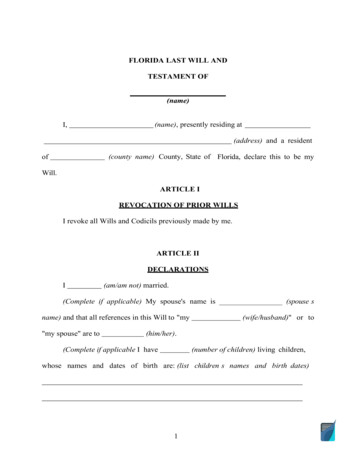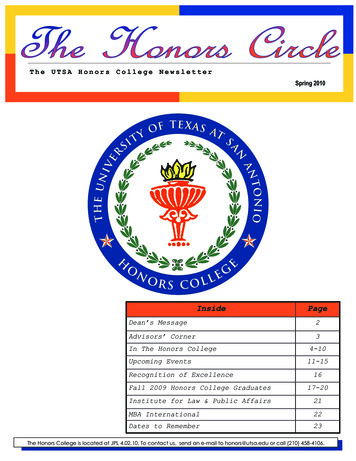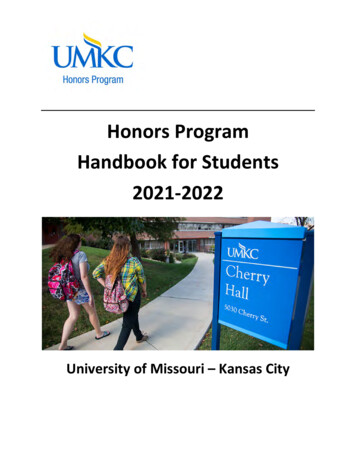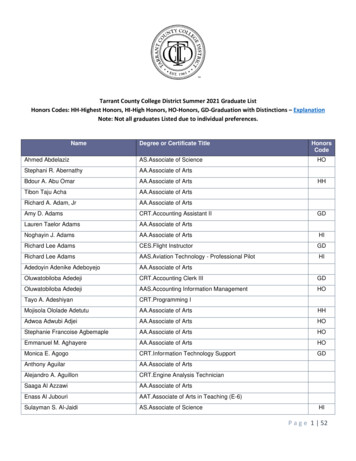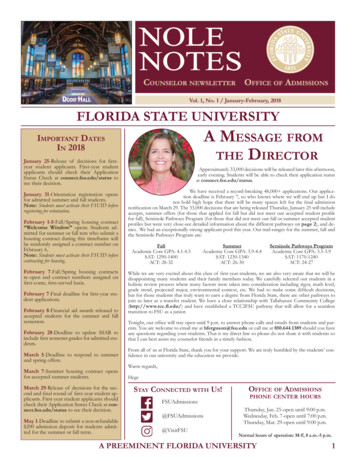
Transcription
Summa cum laudeThe Florida International University Honors College ReviewW i n t e r 2 0 1 1 Vo l u m e 1 , N o . 3Honorsin Research
SPRING 2012Quenchyour intellectual thirstSatisfyyour hunger for meaningful dialogueFood For Talk is a cocktail and dinner forum withuniversity scholars leading discussions on a wide arrayof fascinating topics in an intimate small group setting.Discover the intellectual treasures at Miami’s leadingpublic institution of higher learning. After a beer andwine reception, dinner will be served at a table where anexpert-led discussion will ensue. Proceeds from Food forTalk benefit the Florida International University HonorsCollege scholarship program.Join Us Thursday, April 19, 20126:00 pmCity Hall - The Restaurant2004 Biscayne Blvd.Miami, FL 33137For information, please visit http://honors.fiu.edu/F4T
Summa cum laudeThe Florida International University Honors College ReviewW i n t e r 2 0 1 1 Vo l u m e 1 , N o . 3Welcome to the latest issue of Summa Cum Laude,which this year was named the best Honors publication inthe country by our professional organization, the NationalCollegiate Honors Council. This edition highlights the workof the Honors College and its students and faculty in the areaof research. Until very recently, the development of seriousresearch skills and opportunities for undergraduates had beena long-neglected area of university life. Nationally, honorsprograms have helped advance acceptance of the importance of focused, mentoredresearch before students proceed to graduate school.FIU’s Honors College has been a leader in this movement, sponsoring an ever-growingundergraduate research conference for eight years. The spring conference was expanded totwo days and the quality of the work displayed was remarkable. This year, we have raisedthe bar considerably, offering support awards for outstanding research and initiating a newundergrad-to-grad bridge program that provides stipends to Honors students who joinestablished FIU research teams, with tuition waivers and further stipends if they continueon to an FIU graduate program. Our ARCH course has been revamped and now focuseson intensive mentoring and subject affinity groupings. And our service-research courses arepioneering a new pedagogy that is transcending the old service-learning model and settingthe standard for undergraduate community-based research. It is our intention to be thecutting-edge undergraduate research program in the country.Many of our alumni researchers are highlighted in the issue. You, our alums, canmake all the difference for the scientific and technological leaders of tomorrow. Ourannual campaign has just begun, and you should be contacted by phone by our studentcallers. Please pick up the phone and talk with them. Not only will your contribution,in any amount, go far toward bolstering our scholarship resources, but we will be able toupdate your contact information and ask you about your experience with Honors or itsearlier version, the Faculty Scholars Program. Your input will help us determine the futurecourse of our Honors College. If you aren’t called, we may not know how to reach you—please give us a call or an email telling us where you are. You are also alumni of anotherFIU college—the one that gave you your degree—but please don’t forget the Honorscommunity of which you are also an integral part. Don’t hesitate to let us know about yourimpressions and experiences with your FIU Honors College!I hope you will be proud and excited reading about your College and your colleagues.I look forward to seeing you this April 19 at the Third Annual Food for Talk event, to beheld this year at the hot new City Hall restaurant on Biscayne Boulevard.Lesley A. NorthupDean2Pu 011bli NCcatio HCn o Hof th norey searIn this Issue03ARCH: From Studentto ResearcherAdvanced Research andCreativity in Honors is a newresearch program helping toprepare students for grad schooland beyond.06Uncovering theExtra DimensionPete Markowitz is finding outwhat the universe is made of andhow it works.08The Everglades: FromBeginning to End?This unique Honors College classtakes place in the Everglades.10Gabriel Rincón-Mora1624Honors NewsEngineering professor andresearcher at Georgia Institute ofTechnology and Honors alum.What are they up to?Alumni NotesEditorial StaffKanchana Marapana, EditorPablo CurreaLeif ElliottGustavo EmdenJ.C. EspinosaJuan LopezDesign and ProductionAileen Solá-TrautmannSenior DesignerFIU External RelationsOffice of PublicationsOn the CoverClick to Give – honors.fiu.edu/enrichInvest in the Honors College and its future leaders. Support the College’s uniqueprograms and innovative curriculum. Contribute to the cutting edge of education.Change of address information: Please send updated address information to theHonors College, DM 233, Florida International University, 11200 S.W. 8th Street,Miami, FL 33199 or by e-mail to hcalumni@fiu.eduCross section view of the Compact MuonSolenoid (CMS) located in an undergroundcavern at the European Organization forNuclear Research (CERN) facility in France.Image taken from CERN website(http://cdsweb.cern.ch/).Letters to the Editor: Share your news, ideas, and stories with us and ourreaders. Summa Cum Laude welcomes letters to the editor by e-mail tohcalumni@fiu.edu, by fax to 305-348-2118 or by mail to Summa Cum Laude,The Honors College, DM 233, Florida International University,11200 S.W. 8th Street, Miami, FL 33199.The Honors College Review1
StudentProfiledanieltapanesAmerica’s Top Honors StudentDanny Tapanes, a senior in FIU’s Honors College, was named Studentof the Year during this fall’s National Collegiate Honors Council (NCHC)conference in Phoenix, Arizona. The award is highly competitive. NCHChas approximately 850 member institutions from throughout the UnitedStates and overseas, and each may nominate one student—and only one ischosen from those nominees.Danny, a biology and chemistry double major and humanities minor,plans to pursue an MD/Ph.D. in tropical medicine, specifically inparasitology. He is a MARC*USTAR fellow, a MulticulturalPrograms and Services (MPAS) Scholar, and a QuantifyingBiology in the Classroom (QBIC) Scholar. Academically,his achievements can’t be overstated: five scholarships; fourprestigious research positions; three juried conferencepresentations; three honors societies; a research grant; anda published article. He was recently invited to conductresearch at the laboratory of Dr. John Janovy at theUniversity of Nebraska—one the country’s premierparasitology labs.Last summer, Danny’s research took him to thePeruvian Amazon with the Honors service-researchstudy abroad program. He conducted research onparasites in fish stocks. His attention quickly turned tothe local indigenous population when he noticed thatthe closest medical clinic was many hours away by boatduring medical emergencies. Tapanes brought togethergovernment authorities, a Peruvian architect, and city ofIquitos medical personnel to begin building a clinic forthe Yagua people. Danny will return to the Amazon nextsummer to continue this important initiative with thehelp of American and Peruvian volunteers.Before the Amazon clinic project, Danny alreadyhad considerable experience in launching student-ledphilanthropic projects. During his freshman year he createdHelping Our World (H.O.W.), an Honors College group thattravels abroad to assist children in impoverished communities.His sophomore year he founded Students Taking InitiativeThrough Collaboration in Honors (Pre-Med S.T.I.T.C.H.),an Honors College organization for pre-med students. He alsogrows out his hair to contribute to Locks of Love.In short, Daniel Tapanes is a Worlds Ahead student. Inthe words of Dean Northup, “He is the complete package; aRenaissance man whose achievements set the bar for every student. He isan individual who you will read about in the news for years to come.” p2The Honors College Review
From Studentto ResearcherLast year, the Honors College undertook an ambitious new initiative to expand and improveundergraduate research skills and opportunities. Advanced Research and Creativity in Honors(ARCH) has rapidly grown into a trend-setting, multi-faceted program that prepares students forgraduate school and high-impact careers—particularly in the STEM fields (science, technology,engineering, and math), but also across the disciplines.ARCH is an integrated program of research training, fellowships, internships, and conferenceparticipation that also features the Honors College’s groundbreaking and quickly developingservice-research approach.Research training begins with an enhanced version of the university’s required First-YearExperience course, in which Honors students are introduced not only to college life, but mostimportantly, to college-level research. Their skills are immediately put to use in the first-yearHonors seminar, which requires two major research projects that are carefully mentored by thefifteen faculty members of the first-year team. One such assignment is the museum project,which requires students to select a piece from FIU’s Wolfsonian Museum of art and moderndesign and conduct an in-depth research analysis of its cultural significance. The other focuseson the notebooks of Leonardo da Vinci.The Honors College Review3
tPablo Currea - Creativity: the Corpus CallosumBetween Left and Right Brain ThinkingPablo Currea looks at a “Dream Machine”program that induces trance-like states forhis ARCH project.Toward the end of their second year,students can choose from an array ofadvanced research options designedto make best use of their interests andtalents. Perhaps the most exciting of theseopportunities is the new Honors-toGraduate (H2G) Research Fellowship. Thisinnovative partnership with the UniversityGraduate School and Office of Research isopen to selected Honors juniors who arestrongly interested in remaining at FIUfor their graduate work. These studentswill join ongoing funded research projects,becoming full members of a research teamalong with the faculty principal investigator,allied researchers, and graduate students.While still undergrads, they will receive anannual research stipend between 2,000 to 3,000. If they continue at FIU as graduatestudents, presumably in the same departmentand quite possibly working on the sameproject, they will receive a tuition waiver aswell as a continuing research stipend. Thisis an excellent opportunity for FIU studentsto fund their graduate work and for FIU toproduce top home-grown talent.Honors students may also participatein the all-new service research seminar,Engaged Research in the Communitythrough Honors (ENRICH). Thissix-credit course, which combines themethodologies of community-based4research and service learning, providesstudents the chance to work intimatelywith the community in the City ofSweetwater. Intensive individual researchleads students to identify community issuesand to propose and implement projectsaddressing them. The seminar builds onthe innovative model used in the College’sstudy abroad program in the PeruvianAmazon, where recent student-generatedprojects include studies on water quality,domestic animal health, the preservationof traditional music, and eco-tourism. Soencouraging have been the results of theseinitiatives that the College is workingtoward integrating the service-researchmethodology throughout the curriculum.ARCH also now offers formal trainingin research procedures for studentschoosing the six-credit ARCH seminaroption. Professor Anthony J. McGoron ofBiomedical Engineering, who became theco-director of the program this year, hasjoined Associate Dean Juan Carlos Espinosa,a political scientist, to provide hands-onmentoring and training to supplementARCH students’ work with their individualfaculty mentors. A series of workshops givestudents the tools and guidance to prepareprofessional-level work.The capstone of ARCH is the annualARCH Conference in late March, where allThe Honors College Reviewstudents who opt to complete a six-creditresearch project resulting in thesis-levelwork present their findings. This spring,seventy-five of the College’s best youngresearchers presented at the Eighth AnnualARCH Conference. Students may work onfunded faculty projects or find a mentorto work with them on a topic of personalinterest. The ARCH option includes seniorresearch projects, departmental honorstheses, and International Business Honorstheses, and allows students to do a quarterof their Honors credits in their majors orrelated fields. The research option has beenformalized into a year’s intensive work underthe direction of faculty mentors from acrossthe university’s disciplines and has led to anincrease in both the quality and the quantityof the work. As a result, the 2011 conferencewas for the first time expanded to two days.Moreover, seven students whoparticipated in ARCH were selectedto present their work at the NationalConference for Undergraduate Research.The annual event, held from March 30thto April 2nd, drew over 3,300 studentsfrom 370 universities around the countryto Ithaca College in Ithaca, New York,also home to Cornell University. The FIUdelegation to this prestigious symposium,the largest in recent years, underlinesthe importance given to research and
tAdria Llerena - The Consequences of WarAdria Lerena is designing an art installationinspired by the Peter Paul Ruben painting,Consequences of War.tStephanie Cabrera - Does Insect Flight stabilizationDepend on Varying Optic Flow Fields?For one of her experiments, Stephanie Cabreraglues a rod to a fruit fly in order to mount the insectto a 3D simulator.mentorship at the Honors College.This year, FIU has funded, through aCritical Investment grant, scholarshipsfor Honors students doing advancedundergraduate research. Students compete forfunds of up to 1,000 to finance and conducttheir work. The first grants were awarded thisfall to the following student researchers: Stephanie Cabrera, Does Insect FlightStabilization Depend on ApparentDistances in Optic Flow? (mentor:Jamie Theobald). Alejandro Vazquez, Tip-of-the-Tongue(TOT) State: Metacognition of Faces(mentor: Bennett Schwartz). Raul Camarca, Unfurling the Geoweb:Applications for the Distribution ofGeospatial Data (mentor: Naphtali Rishe). Luciana Viola and Belinda Sardinas,Costa Rica Recycling Project (mentor:K. Galen Kroeck). Kristina Bado, How Do Gender Studiesand Gender Curriculum Serve toRecreate and Perpetuate the Standardsof Gender Itself? (mentor: Sean Walsh). Rene Ferrer, Fidelity and Sexuality orApocalyptic Visions within ArthurianLiterature (mentor: Heather Blatt).Clearly, mentors are critically importantto the success of ARCH. Senior MarlenePalomo describes her mentor, ScottFingerhut of the College of Law, as “nothingshort of fantastic. He has provided me withguidance and connections that I would nothave had otherwise.” Physics professor andHonors College Fellow Pete Markowitz[profiled in this issue] says, “Laboratoryresearch lets the students turn classroomtheory into real experiences. Getting theirhands dirty does more, though -- it turnsthem from students to researchers, joiningtheir professors as peers.”ARCH has grown by some 40% overthe last two years, in terms of both studentand faculty participation. In response, theCollege has established affinity groupswithin ARCH, peer-centered groups offour to six students working in similardisciplines or conducting research on topicswhere interdisciplinary communication canadvance their work. In addition, Saraswati,an online student-run research journal, goeslive this fall.Increasingly, research experience isbecoming a standard for undergraduatespursuing graduate studies in the sciences.In fact, its prevalence has led graduateschools and employers to expect it fromtheir applicants. A recent study conductedby the National Science Foundation (NSF)found that 72% of chemistry studentsand 74% of environmental sciencestudents with graduate school aspirationsThe Honors College Reviewhad research experience before applying.Similar studies conducted by the MichiganDepartment of Education and SRIInternational concluded that participationin undergraduate research directlycorrelates with higher levels of studentretention and motivates students whopreviously were not interested in advancedgraduate studies to pursue Ph.D.s. Thesebenefits extend not only to studentsstudying the sciences and mathematics,but those studying social sciences andhumanities as well.Clearly, research is at the core of theHonors curriculum. ARCH is expectedto grow by another 25% next year, withover a hundred students presenting atnext spring’s conference. The conference,scheduled for March 26th and 27th, isexpected to expand to a third day and toinclude other universities. The HonorsCollege is also coordinating FIU’s hostingof the 2014 Florida UndergraduateResearch Conference. The College hasalready been approached about partneringwith other Florida institutions, as well asuniversities in other countries. As FIUincreasingly recognizes the importanceof developing undergraduates’ researchskills, the College stands ready to exportits expertise and experience to the largeruniversity community. p5
Who has not gazed up atthe sky and wonderedwhat is out there? A few brave souls tryto unravel the mysteries of the Big Bang,black holes, parallel universes and extradimensions. FIU’s very own physicist,Dr. Pete Markowitz, is among some10,000 visiting scientists who investigatethese questions at the EuropeanOrganization for Nuclear and ParticlePhysics (CERN) in Geneva, Switzerland.Markowitz carries out nuclear andparticle physics experiments at theThomas Jefferson National AcceleratorFacility (JLab) in Virginia as well as atCERN. His work focuses on the sourceof gravity, extra dimensions, blackholes, the quark structure of nuclei, darkmatter, dark energy and the electroproduction of matter and anti-matter.Markowitz’s experiments use highenergy accelerators to bombard varioustarget materials with subatomic particlesand then measure the reactions. CERNis one of the world’s largest and mostrespected centers for research intofundamental physics—finding outwhat the universe is made of and howit works. By studying what happenswhen these fundamental particlescollide, physicists are uncovering newunderstandings of the laws of nature.Markowitz’s research on extradimensions takes him to CERN forseveral weeks at a time, four or five6The Honors College Review
Uncovering TheExtra Dimensiontimes a year. Teams of physicists useHarvard and Kani Hoffmann fromabout extra dimensions are right, thenhighly specialized equipment to analyzePrinceton predicted that there couldthey ought to be there.”the particles created by collisions in thebe extra dimensions. This wouldLarge Hadron Collider (LHC) [see cover],explain why gravity is so much weakerhas reported that an experiment ina gigantic particle accelerator thatthan, say, electricity or magnetism.a collider like the one at CERN hasspans the border between Switzerland“Understanding gravity is importantproduced a particle measured movingand France about 100 m underground.when you are looking at something likeat 60 nanoseconds faster than theAccording to Markowitz, “Scientiststhe Big Bang and trying to understandspeed of light. These findings wouldfrom all over the world are working onwhat would have happened. In the Bighave a direct impact on Markowitz’shundreds of different experiments thatBang, all the forces in the universe hadwork and potentially on us all: “If theseare trying to measure different pieces ofequal strength. This implies that thereresults can be confirmed, we couldphysics; we are directly testing the bigmust be more to the universe than justperhaps dream of faster-than-lightbang theory and recreating the matterwhat we are seeing.”travel to the stars, or of exceptions tothat existed during the big bang.”Currently a group of scientists isMost recently, a group of scientistsEinstein’s established laws of physics.looking into a possible fifth force thatIt could literally be the biggest resultresearch is conducted on extrawould modify our understanding ofin a hundred years. Although thedimensions. We all recognize thegravity. “There is also another force inexperimenters are cautioning everyonethree spatial dimensions of length,the universe, a force that we know butnot to read too much into the newwidth, and depth. Time is the fourthhave not identified or understood, calledfinding, the potential if this result isdimension. But what could possibly bedark energy. For example, the galaxiescorrect would be mind-boggling.”an ‘extra’ dimension? Markowitz says,are spinning so fast that pieces shouldMarkowitz brings the same“We think that these extra dimensionsfly off, yet they don’t. The galaxy is heldenthusiasm and cutting-edge thinkingare not ‘reality’ like x, y, z or time,together by something in addition to theto the classroom. During his time atbut something called a compactifiedgravitational force and a large mass, butFIU, he has taught classes acrossdimension. We know that we can gowe can’t see this force.”the academic spectrum ranging fromOne fascinating area of Markowitz’Hawking radiation (named afternuclear physics to the Freshmanthe new dimension, we think evenfamed physicist Stephen Hawking) is aExperience course. Markowitz, agoing forward forever would be liketype of thermal radiation predicted to beFellow of the Honors College, alsomoving just a millimeter. Spaces are allemitted by black holes, but “so far weteaches the second-year seminar,curled up in these dimensions.”haven’t observed the radiation directly,”where he is repeatedly acclaimed assays Markowitz. “But if the theoriesone of our top professors. pon forever in the x dimension. But inScientists Lisa Randall fromThe Honors College Review7
TheEvergladesFrom Beginning to End?Fourteen years ago, Professor Peter Machonis proposed a very unusualidea for an Honors course—no classrooms, no meetings twice a week, nohovering over desks. Machonis, a classical pianist whose specialization isFrench linguistics, wanted to take a dozen or so students to the Evergladesevery other Friday, put them in canoes, and take them on a true adventureof discovery. Over the years, Machonis and his co-instructor, DevonGraham, a biologist, have developed an on-site, hands-on course throughwhich students study not just the biology, botany, and ecology of the Riverof Grass, but also its history, politics, literature, art, andsociology. Students explore Florida’s unique fresh waterswamp in airboats and canoes, in films and books, and on“slough slogs” that totally ruin a pair of sneakers.8The Honors College Review
The students are initiated into thecourse during the first class excursion.The airboat stops in the middle of pristinewetlands and Machonis and Graham invitethe students to jump into the Evergladesand get wet. “Generally, witha combination of peer pressureand the mild threat of failingto get full class participationcredit, everyone jumps in andexperiences the Everglades,” saidGraham. The students enjoy themoment. It is liberating to escapeto a seldom-visited place beyondpaved confines. At that moment,the professors can sense a groupunity. They know that theseplayfully curious 18 students willexperience more of these momentsthroughout the course.“The Everglades: FromBeginning to End?” combinesmany of Machonis’ passions: hislove of the written word, birdwatching, and canoe rides downthe serene, expansive Everglades.The course was intended as aone-time offering in the fall of1997 to correspond with the 50thanniversary of the dedication ofthe Park. “We talked about theimportance of each class location andits historical and literary relevance. Forinstance, we would share with the studentsimpressions of Lieutenant Hugh L.Willoughby’s journal, Across the Everglades(1898), in the middle of a 5 ½-mile canoetrip. We had to have a required writingcomponent for an Honors course as well,so we decided to have the students writetheir own journal entries, like Willoughby,”said Machonis.The course thrives because nothing elselike it exists at FIU or anywhere else. Theclass can be physically challenging sinceit involves hiking, biking, canoeing, andwalking though the swamp, rain or shine.Students must learn to identify SouthFlorida flora and fauna with binoculars andfield guides. Over the years, the class hasbrought park rangers and guest lecturers,including famed Everglades photographerClyde Butcher and popular writer CarlHiassen, to give different perspectives onthe park’s present and future.Some of the course’s components haveevolved over time. Students create projectsabout the Everglades by developingposters, which go on display every yearat the Coe Visitor Center in the Park.These research projects are regularlycompetitively accepted for presentationat the annual National CollegiateHonors Council Conference (NCHC).“I think that participation in NCHCfor both ourselves and the students hasreally opened our eyes to new ways ofapproaching subjects and of presentingmaterial, and has also emphasized theuniqueness of the Everglades course andhow aspects of it can be implemented intoother Honors Programs,” said Graham.The two professors now conduct differentobservational exercises during class, suchas City as Text, and creative assignmentslike “writing on your feet,” where studentsThe Honors College Reviewwrite about their experiences as theyhappen. “You should also write aboutwhat you are thinking before you go intothe muck!” said former Everglades studentCarmen Barresi.One of the most rewardingmoments for the class comes when thestudents present simplified versions oftheir projects to Sweetwater MiddleSchool 5th graders. Watching thereactions of both the school childrenand their own students as they becomepassionate about the Everglades is oneof the most rewarding parts of thecourse for the instructors. Machoniswas impressed listening to studentOmar Leon talk about learningresponsibility through working on hisSweetwater Elementary project: “Herealized that he was representing FIU,the Honors College, and our classwhen he made an appointment withthe principal to talk about plantingnative plants at the school with thepupils. He had to set up meetings andthen follow up the plans with action.”Machonis believes attitudesare changing about the need topreserve the Everglades. In years ofteaching the course, he has seen somerestoration projects come to fruition,such as governmental land buyouts,agricultural-derived phosphorous reductionprojects, and the building of a new bridgeto restore the north-to-south water flowinto the Everglades. He also sees theattitude difference every time he runs intohis former students at the park. Some arecamping or bird watching while others aredoing volunteer work. He knows that hisstudents get something meaningful fromtheir experiences, but he still admits that“each new generation has to be convincedabout the importance of the Everglades toSouth Florida—not only as the source ofall our water, but also as a place to learn,to be inspired, and to grow intellectually,artistically and spiritually.” phttp://honors.fiu.edu/sloughslog9
10The Honors College Review
Gabriel A. Rincón-Morateaching or conducting research, he travelsconsumer products like cell phones andEight books, 120 scientific publications,around the world helping others. He haslaptops, then moved into harnessing energy37 issued patents, 26 commercial powerworked with children affected by AIDSchip designs, and over 60 internationalfrom tiny generators that convert ambientand disabilities in India, built schools inspeaking engagements —and that is just aenergy into the electrical domain. “I haveTanzania, and worked with orphans infraction of Gabriel Rincón-Mora’s long listbeen excited about my work at everyMongolia and Vietnam.of accomplishments.stage, and harvesting energy with microAmong his nonacademic achievementsThis remarkably accomplished Honorsscale devices is now equally exciting forare climbing Mounts Everest andCollege alumnus was born in Venezuelame,” said Rincón-Mora. Many scientistsKilimanjaro. His philosophy is to liveand emigrated to the US when he was 11and engineers tend to concentrate on thelife fully, “because what isyears old. During his senior yearimportant is not the actualin North Miami Beach Seniorend but the process. TheHigh school, Rincón-Moravalue of what we do is ourattended FIU to work in animpact on other people'selectrical engineering lab. It wasexperience through life. Humanhis introduction to the universityinteraction is important becauseand to electrical engineering. Heits effects never stop ripplingfell in love with both.through time and space andRincón-Mora enteredthrough others and the peoplethe Honors Program (thenthey touch in turn."known as the Faculty ScholarsWhen asked to offer adviceProgram) in 1989. “FIU andto current Honors students, hethe Faculty Scholars Programhad this to say: "I'm not sureoffered me excellent growthif I'm qualified to offer advice,opportunities. Classes con-Mora’steambecause like everyone else, I'mchallenging and enlightening,”developed to charge lithium-based batteries from energy in vibrationsstill learning. If pressed, I'd saysaid Rincón-Mora. “I realizedthat being passionate, generally optimistichow well prepared I was later when I went conversion process, not the managementand conditioning aspects of generatingin life, and honorable and professional haveto Georgia Tech to pursue my master’sthe power needed to energize and operatehelped me. Passionate people care aboutand Ph.D. degrees, because I was asreal-life microelectronic systems like wireless their jobs, and when you care, you excel.prepared as anybody else there, and inmicrosensors, which can continually collect,And an optimistic mind n
Miami, FL 33199 or by e-mail to hcalumni@fiu.edu Letters to the Editor: Share your news, ideas, and stories with us and our readers. Summa Cum Laude welcomes letters to the editor by e-mail to hcalumni@fiu.edu, by fax to 305-348-2118 or by mail to Summa Cum Laude, The Honors College, DM 233, Florida International University,



